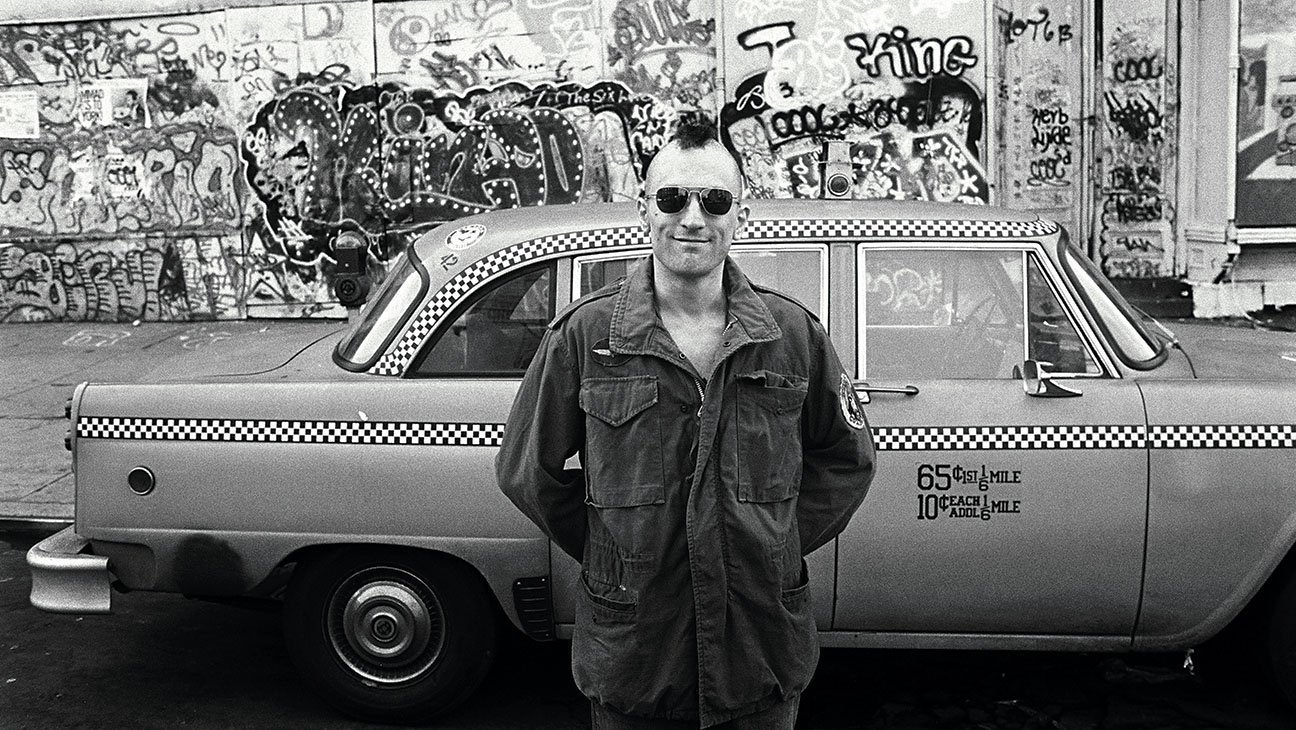The opening shot of ‘Taxi Driver’ shows New York City being engulfed by smoky exhausts followed by the yellow taxi. Bernard Herrmann’s hauntingly provoking score gives the scene a horror-esque feel. The scene changes to a close-up of Travis’s eyes in shifting red-and-black lighting. The film establishes in the beginning itself that we see the narrative through Travis’s eyes.
The eponymous taxi driver Travis Bickle played by Robert De Niro is a 26-year old Vietnam War veteran who was “honourably discharged” from the Marines. Suffering from insomnia, probably as a result of his time in the war and unable to readjust to the civilian life of the late 70s New York, he takes up late night shifts at the taxi company ready to drive anytime, anywhere.

Michael Chapman’s brilliant cinematography gives the street life of its own. The New York depicted here is out of control yet it is seductive.
The city seems to be inhabited primarily by the lost, the murderous, the impoverished;
1. Travis himself says “All the animals come out at night. Whores, skunks, pussies, buggers, queens, fairies, dopers, junkies. Sick. Venal.” Yet there is something grotesquely beautiful about the neon-lit, eternally wet, crammed sweltering streets- an urban hell which has its perverse attractions.
2. The city is seen through Travis’s windshield and rear-view mirror is an iridescent cascade of neon lights and the chaotic life on the streets – the shadows and shapes that inhabit them – are as exhilarating as they are threatening.
Travis drives around the city in languid anomie. He hates New York with a Biblical fury; it gives off a stench of hell and he wants to flush it all down the toilet.
3. Betsy (Cybill Shepherd), a political campaigner, with her introductory shot in her blonde hair and white clothes represent purity to him. She is an angel in this filthy mess who, he thinks or rather wishes, can save him from this suffocating hell.
Jodie Foster, a twelve and a half-year-old prostitute who runs away from her home in Pittsburgh, plays the other primary female character, Iris.
In an interview with Roger Ebert, Scorsese said that Travis suffered from the goddess-whore complex. “You’re raised to worship women, but you don’t know how to approach them on a human level, on a sexual level. That’s the thing with Travis”
4. On one hand he takes Betsy to a porno movie for a date and on the other hand, he tries to rescue Iris from the pimp.
Taxi Driver seems to be like a Hollywood version of Dostoyevsky’s Notes from Underground. Travis writes in his diary regularly – of his inability to sleep, his failure “to become a person like other people”, his hatred for the scum and low-life of the streets. The paranoid, solipsistic cab driver struggles to find his purpose in life.
There’s a scene of a fizzing cup of water (due to a dissolving tablet) in the cafeteria where Travis sits with Wizard and two other cabbies. The zoomed-in still of the cup mirrors Travis’s own life dissolving in this filthy mess. He takes pills, drinks quite a lot and regularly goes to the theatre to watch pornographic movies. He himself indulges in the activities that he considers lowly. Then how is he any different from the others on the street?
Certain shots in the film even hint at a very subtle attitude of racism in Travis’s psyche like the scene where he stares at the black pimps in the cafeteria. Scorsese doesn’t give any moral judgment to these thoughts or actions. His Expressionist style merely brings out its underlying tones. The shot of the decaying flowers which he tries to send to Betsy reflects his own decaying, useless life. There’s a kind of hopelessness and an engulfing sense of suffocation in Travis’s life.
In the postmodern world, every person is struggling to find the meaning of his/her life. As Tyler Durden says in Fight Club, “Our great war is a spiritual war… Our great depression is our lives.”
Also Read, 10 Films to Watch if You Love Fight Club
Bibliography
Leonard Quart, A Slice of Delirium: Scorsese’s “Taxi Driver” Revisited ( Film Criticism, Vol. 19, No. 3 (Spring 1995), pp. 67-71)
Ibid (1.)
Ibid (1.)
Roger Ebert Interview.


